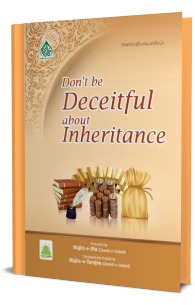Islamic distribution of inheritance
Syed Rehan Ali
Introduction
Free from inequalities, Islam has established an excellent method for the distribution of inheritance, bestowing an appropriate share upon everyone. Specific commandments have been issued regarding the inheritance of women and orphans. Breaking the tradition of depriving women and children of their inheritance, the Holy Quran has declared a share for each man and woman in the inheritance of their parents and other relatives. The commandments of particularly protecting the wealth of orphans, giving it to them when they need it and refraining from every type of fraud regarding their wealth, have been clearly issued.
It has been declared that misappropriating the wealth of orphans is like filling one’s belly with fire and leads to Hell. The guardians of orphans have also been admonished and advised. They were asked to ponder what would happen to their own vulnerable offspring if they (i.e. the guardians of orphans) died? Of course, they would become careful and concerned about their own offspring; similarly, they should be careful and concerned about the orphans who are the offspring of others. Fearing Allah Almighty, they should act upon the religious rulings on the wealth of orphans.
The sad truth is that like other financial issues, Muslims are showing extreme negligence in following the Quranic laws of inheritance distribution. It is as though the same injustice and inequalities that existed before Islam exist even today amongst Muslims in various forms. For example, disinherited offspring or daughters are not given their share of inheritance out of ignorance. In many places, widows who remarry are deprived of the inheritance left by their deceased husbands. The wealth of orphans is unjustly and unfairly taken by uncles or other relatives in many places.
Hopefully, this article will provide some guidance to Muslims on how to protect themselves from sins when it comes to the distribution of inheritance.
Islamic rules of inheritance
Allah Almighty has described most inheritance laws in the Holy Quran in great detail and emphasised compliance with them in various ways. Allah عَزَّوَجَلَّ says in the Holy Quran:
یُوْصِیْكُمُ اللّٰهُ فِیْۤ اَوْلَادِكُمْۗ-لِلذَّكَرِ مِثْلُ حَظِّ الْاُنْثَیَیْنِۚ-فَاِنْ كُنَّ نِسَآءً فَوْقَ اثْنَتَیْنِ فَلَهُنَّ ثُلُثَا مَا تَرَكَۚ-وَ اِنْ كَانَتْ وَاحِدَةً فَلَهَا النِّصْفُؕ-وَ لِاَبَوَیْهِ لِكُلِّ وَاحِدٍ مِّنْهُمَا السُّدُسُ مِمَّا تَرَكَ اِنْ كَانَ لَهٗ وَلَدٌۚ-فَاِنْ لَّمْ یَكُنْ لَّهٗ وَلَدٌ وَّ وَرِثَهٗۤ اَبَوٰهُ فَلِاُمِّهِ الثُّلُثُۚ-فَاِنْ كَانَ لَهٗۤ اِخْوَةٌ فَلِاُمِّهِ السُّدُسُ مِنْۢ بَعْدِ وَصِیَّةٍ یُّوْصِیْ بِهَاۤ اَوْ دَیْنٍؕ-
Allah commands you concerning your children (regarding their share of inheritance); the share of the son is equal to the share of two daughters; then if there are only daughters, even if more than two, for them is two-thirds of the inheritance. And if there is only one daughter, for her is one half. For each of the parents of the deceased is one sixth of the inheritance, if he has children. Then, if the deceased has no children but leaves behind parents, so one third is for the mother (and the remaining is for the father). Then, if he has several brothers and sisters, so one sixth is for the mother after any will he had made and (after) payment of debt (if owed by the deceased).
[Kanz-ul-Iman (translation of Quran)] (Part 4, Surah Al-Nisa, Verse 11)
Allah Almighty has also said:
وَ لَكُمْ نِصْفُ مَا تَرَكَ اَزْوَاجُكُمْ اِنْ لَّمْ یَكُنْ لَّهُنَّ وَلَدٌۚ-فَاِنْ كَانَ لَهُنَّ وَلَدٌ فَلَكُمُ الرُّبُعُ مِمَّا تَرَكْنَ مِنْۢ بَعْدِ وَصِیَّةٍ یُّوْصِیْنَ بِهَاۤ اَوْ دَیْنٍؕ-وَ لَهُنَّ الرُّبُعُ مِمَّا تَرَكْتُمْ اِنْ لَّمْ یَكُنْ لَّكُمْ وَلَدٌۚ-فَاِنْ كَانَ لَكُمْ وَلَدٌ فَلَهُنَّ الثُّمُنُ مِمَّا تَرَكْتُمْ مِّنْۢ بَعْدِ وَصِیَّةٍ تُوْصُوْنَ بِهَاۤ اَوْ دَیْنٍؕ-وَ اِنْ كَانَ رَجُلٌ یُّوْرَثُ كَلٰلَةً اَوِ امْرَاَةٌ وَّ لَهٗۤ اَخٌ اَوْ اُخْتٌ فَلِكُلِّ وَاحِدٍ مِّنْهُمَا السُّدُسُۚ-فَاِنْ كَانُوْۤا اَكْثَرَ مِنْ ذٰلِكَ فَهُمْ شُرَكَآءُ فِی الثُّلُثِ مِنْۢ بَعْدِ وَصِیَّةٍ یُّوْصٰى بِهَاۤ اَوْ دَیْنٍۙ-غَیْرَ مُضَآرٍّۚ-وَصِیَّةً مِّنَ اللّٰهِؕ-وَ اللّٰهُ عَلِیْمٌ حَلِیْمٌؕ(۱۲)
And for you is one half from that what your wives leave behind, if they do not have children. Then, if they have children, for you therefore is one fourth of what they leave after payment of any will that (they) had made or (their) debt yet to be paid. And for the women is one fourth of what you leave behind, if you do not have children. Then, if you have children; so one eighth of what you leave behind after any will you had made, or debt yet to be paid. And if the inheritance of such a (deceased) man or woman is in the process of being distributed who did not leave behind a mother, father or children, but has a brother or a sister through a common mother, to each of them is therefore one sixth. Then, if the brothers and sisters are more than one, so they shall all have a share in one third after payment of any will or any outstanding debt, in which the deceased has not caused harm (to the heirs by making an unfair will). This is the decree of Allah, and Allah is All-Knowing, Most Forbearing.
[Kanz-ul-Iman (Translation of Quran)] (Part 4, Surah An-Nisa, Ayah 12)
Benefits and blessings of distributing inheritance
The commandments, principles and laws which Islam has established for Muslims consist of countless worldly and religious advantages, blessings, bounties and benefits. Here are some of the religious and worldly benefits and blessings of distributing inheritance in accordance with Islamic laws and principles:
Distributing inheritance in accordance with Islamic laws and principles will lead you to please Allah Almighty. Anyone who acts upon Shar’i rulings on inheritance, deserves Heaven and remains safe from the humiliating torment of hellfire, which is a great success in the afterlife. The inheritance that a person has gained by following Islamic laws is Halaal and any financial worship that is carried out with Halaal wealth will be accepted. Distribution of inheritance in accordance with Islamic laws is an absolutely fair and just distribution. Otherwise, this matter usually results in disputes and quarrels. Making sure that weak relatives, women and children receive their shares of inheritance is one of the ways of being a well-wisher of them; and well-wishing of Muslims is one of Islam’s fundamental objectives. This will also earn you their prayers, sympathy and affection. One who distributes inheritance following Shari’ah succeeds in refraining from cruelty and tyranny. He also remains safe from enmity, grudge, jealousy, taunts and criticism from relatives and people.
Disadvantages of not distributing inheritance as per Shari’ah
The one unlawfully taking the wealth of any inheritor will be held accountable for every single penny on the extremely horrific Day of Judgement. Anyone who violates the right of any rightful person will be made to fulfil his right. Not distributing inheritance according to Islamic principles, depriving inheritors of their right is deviation from Islamic teachings and it is like following a practice of disbelievers. The unlawfully obtained inheritance of any other person is ‘Haraam wealth’. The charity given with Haraam money is rejected and the prayer of such a person also remains unanswered. Not giving inheritance to inheritors causes enmity and such a person loses his respect and dignity among people. This also results in the weak people cursing the oppressor who deprives them of their inheritance. The Du’a of the oppressed made against the oppressor is accepted in the Divine court.
Shar’i ruling on your own wealth
It is incorrect to spend your entire wealth in the Divine path and to leave your heirs needy and destitute. Therefore, if you wish to make a will for your wealth to be spent on religious activities, you can do so for less than one third of the total wealth; and for one third at the most. The remaining two third parts of the wealth must be left for heirs. Sayyiduna Sa’d Bin Abi Waqas رَضِىَ الـلّٰـهُ عَـنْهُ narrated: The Beloved Rasool صَلَّى الـلّٰـهُ عَلَيْهِ وَاٰلِهٖ وَسَلَّم said: ‘اِنَّكَ اِنْ تَرَكْتَ وَلَدَكَ اَغْنِيَاءَ خَيْرٌ مِّنْ اَنْ تَتْرُكَهُمْ عَالَةً يَّتَكَفَّفُوْنَ النَّاسَ’ ‘For you to leave your heirs wealthy is better than to leave them destitute who will then beg people.’ (Sahih Bukhari, Kitab-ul-Faraaid, vol. 4, p. 316, Hadith 6733)
Conclusion
Distribution of inheritance is a very crucial matter. Therefore, instead of relying on your own knowledge or taking help from any religious person or from any elderly person of your family, you must take guidance from some respectable Mufti by telling him necessary details and act accordingly. May Allah Almighty enable us to follow Shari’ah in every matter including the distribution of inheritance! Ameen!


















Comments